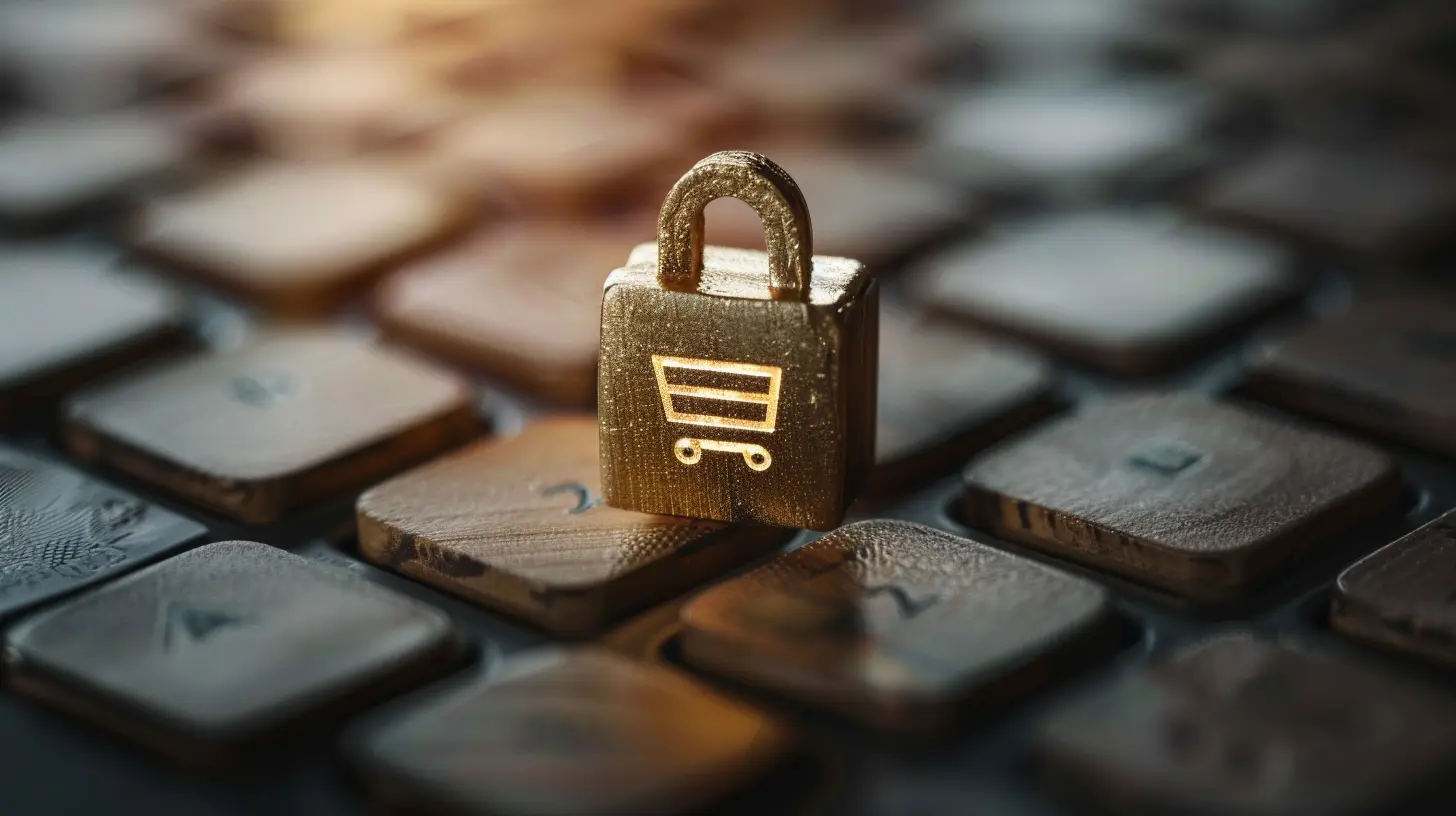The Importance of Cybersecurity in E-Commerce
4 March 2025
E-commerce has completely revolutionized the way we shop, and let's be honest — who doesn't love the convenience of buying things online without leaving the comfort of their couch? From groceries to gadgets, you can shop for almost anything with just a few clicks. But with great convenience comes great responsibility, especially when it comes to protecting the sensitive data of customers.
This is where cybersecurity steps in. It’s the digital bouncer standing guard at the gates of our online shopping world. In today’s tech-driven marketplace, safeguarding sensitive information like credit card details, personal identification, and even browsing habits is not just important; it’s essential. And as online shopping continues to grow, so does the need for robust security measures.
But why exactly is cybersecurity in e-commerce so critical? Let’s dive deep into this important topic.

The Rise of E-Commerce and Cyber Threats
First off, it’s no secret that the e-commerce industry is booming. As more people choose to shop online, e-commerce sales are skyrocketing. However, with that rise in online transactions, cybercriminals are having a field day.Think of it this way: as e-commerce platforms open their doors to more customers, they also unintentionally invite more potential threats. Cybercriminals are constantly evolving their tactics, seeking vulnerabilities in websites to steal sensitive information. It’s a digital game of cat and mouse.
Here’s what typically happens: hackers exploit weaknesses in an e-commerce site’s backend, using techniques like phishing, malware, or data breaches to snag personal information. Once they have it, they can sell it, use it for identity theft, or even drain bank accounts. Not exactly the kind of shopping experience anyone’s looking for, right?

Why Cybersecurity is a Big Deal in E-Commerce
Imagine walking into a physical store, and as soon as you swipe your card, someone grabs your credit card information and runs off. That would be terrifying! Now, that’s the digital equivalent of what happens when e-commerce platforms lack proper cybersecurity measures.So, why is cybersecurity in e-commerce such a big deal? Let’s break it down:
1. Customer Trust Is Everything
Trust is the foundation of any successful business, especially online. When customers hop onto an e-commerce website, they expect that their personal and financial information will be safe. If they don’t feel secure, they’ll bail, and your business will suffer.Think about it — would you shop on a website that you don’t trust? Probably not. One major data breach could shatter the trust you’ve built with your customers, and it’s incredibly difficult to regain that trust once it’s gone. A company’s reputation is everything in the digital age, and cybersecurity plays a huge role in maintaining it.
2. Financial Losses Are No Joke
Beyond the loss of customer trust, there’s also a serious financial hit that businesses can take when they’re hacked. A data breach can lead to a range of expenses, including legal fees, fines, and compensation to affected customers. And let’s not forget about the cost of repairing the damage done to your systems.For small businesses, a single data breach could be catastrophic, potentially even leading to bankruptcy. Even for larger corporations, the financial losses can be in the millions. It’s not just about losing money in the short term — the long-term effects can be devastating.
3. Compliance with Regulations
Governments around the world are cracking down on cybersecurity, especially in industries like e-commerce where sensitive data is constantly being exchanged. Regulations like the GDPR (General Data Protection Regulation) in Europe and the CCPA (California Consumer Privacy Act) in the U.S. require companies to take specific actions to protect their customers' data.Failing to comply with these regulations can result in hefty fines and legal troubles. Beyond just being a good business practice, strong cybersecurity is now a legal requirement in many regions. Ignoring it isn’t just risky; it’s illegal.
4. Rise of Complex Threats
Cyber threats are becoming more sophisticated with each passing day. We’re not just talking about your run-of-the-mill phishing emails anymore. Hackers are deploying advanced tactics like ransomware, social engineering, and Distributed Denial of Service (DDoS) attacks to cripple businesses.What’s worse? These threats are often automated, meaning they can target thousands of companies at once. If your e-commerce platform isn’t secure, it’s only a matter of time before you become a target. And remember, it’s not just big-name retailers that need to worry. Cybercriminals will target anyone they believe has a vulnerability.

The Common Cybersecurity Threats in E-Commerce
To understand the importance of cybersecurity in e-commerce, it’s essential to know the types of threats that exist in the online shopping world. Here’s a quick rundown of the most common cybersecurity threats that e-commerce businesses face:1. Phishing Attacks
Phishing is one of the most common forms of cyberattacks, and it’s getting more sophisticated by the day. Hackers send fraudulent emails that appear to be from reputable sources, tricking users into giving away personal information like passwords, credit card numbers, or login details.Imagine receiving what looks like an official email from your favorite online store, asking you to “verify” your account. One wrong click, and boom — you’ve handed over your sensitive information to a hacker.
2. Malware and Ransomware
Malware, short for "malicious software," is designed to infiltrate and damage systems. Ransomware, a specific type of malware, locks a user’s data and demands a ransom to restore access. For e-commerce businesses, this could mean losing access to transaction data, customer records, or even the entire website.It’s the digital equivalent of a thief locking you out of your own store until you pay up. And even then, there’s no guarantee they’ll give you back your data.
3. SQL Injections
SQL (Structured Query Language) injections are a common attack method where hackers insert malicious code into a website’s database, giving them access to sensitive information. It’s like sneaking into the backroom of a store and rummaging through all the confidential files.This kind of attack can expose customer data, allowing hackers to steal credit card numbers, addresses, and much more.
4. DDoS Attacks
Distributed Denial of Service (DDoS) attacks aim to overwhelm a website with so much traffic that it crashes. Imagine hundreds of people trying to enter a store at the same time, causing a massive pileup at the door. For an e-commerce site, this means downtime and lost revenue, not to mention frustrated customers.5. Man-in-the-Middle Attacks
This type of attack happens when a hacker intercepts the communication between a user and an e-commerce site. It’s like someone eavesdropping on a conversation and stealing your personal information. Without proper encryption, man-in-the-middle attacks can easily compromise sensitive data.
Best Practices for E-Commerce Cybersecurity
Now that we know the threats, the big question is: How can e-commerce businesses protect themselves? The good news is that there are several best practices you can implement to safeguard your online store and your customers’ data.1. Use SSL Certificates
SSL (Secure Sockets Layer) certificates are essential for encrypting the data exchanged between an e-commerce site and its customers. When you see that little padlock icon in your browser’s address bar, that’s SSL at work. It ensures that sensitive information, like credit card numbers, is transmitted securely.2. Implement Two-Factor Authentication (2FA)
Two-factor authentication adds an extra layer of security by requiring users to verify their identity using two different methods. For example, after entering a password, a user might be required to enter a code sent to their mobile device. This makes it much more difficult for hackers to gain access, even if they have the password.3. Regularly Update Software
Outdated software is a hacker’s playground. Make sure to regularly update your e-commerce platform, plugins, and any other software you’re using. Developers often release updates that patch security vulnerabilities, so staying up to date is crucial.4. Conduct Security Audits
Regular security audits are essential for identifying potential vulnerabilities before hackers can exploit them. This might include penetration testing, where security experts attempt to break into your system to find weak points.5. Educate Your Employees and Customers
Cybersecurity isn’t just about having the right tools in place. It’s also about creating a culture of awareness. Educate your employees on best practices for security, such as recognizing phishing emails and using strong passwords. And don’t forget to inform your customers about how they can protect themselves while shopping online.Conclusion: Cybersecurity is Non-Negotiable
The digital world offers incredible convenience, but it also comes with its own set of risks. In the ever-evolving landscape of e-commerce, cybersecurity is not just a “nice-to-have” – it’s a necessity.Without it, you're leaving both your business and your customers vulnerable to cyberattacks. For e-commerce businesses, the stakes are high: customer trust, financial stability, and compliance with regulations all hinge on how well you can protect sensitive information.
In a nutshell, cybersecurity is your silent partner in the world of e-commerce, working behind the scenes to ensure smooth, secure transactions. So, if you’re running an online store, it’s time to take cybersecurity seriously and implement the best practices that will keep your business and your customers safe from harm.
all images in this post were generated using AI tools
Category:
E CommerceAuthor:

Adeline Taylor
Discussion
rate this article
17 comments
Colin Fry
Oh, absolutely! Who needs cybersecurity when you can just cross your fingers and hope for the best? Let’s all just keep our credit card info as public as our vacation photos. Sounds like a foolproof plan, right?
April 6, 2025 at 3:33 AM

Adeline Taylor
While it's tempting to downplay risks, cybersecurity is essential for protecting sensitive information in e-commerce. Ignoring it can lead to severe consequences. Let's prioritize safety over optimism.
Rachel Gibson
Cybersecurity is crucial for e-commerce success. With increasing online transactions, protecting customer data and maintaining trust is essential. Businesses must prioritize security measures to avoid costly breaches and reputational damage.
April 5, 2025 at 6:49 PM

Adeline Taylor
Absolutely! Cybersecurity is essential for safeguarding customer trust and ensuring the success of e-commerce. Prioritizing security measures helps protect against breaches and their associated costs.
Lyra McClary
This article highlights a crucial aspect of online shopping. As e-commerce grows, prioritizing cybersecurity not only protects customers but also builds trust and strengthens brand reputation. Essential reading!
April 4, 2025 at 2:46 AM

Adeline Taylor
Thank you for your insightful comment! I'm glad you found the article valuable in highlighting the importance of cybersecurity for both customers and brands.
Rina Sanchez
Cybersecurity is crucial for e-commerce, safeguarding sensitive customer data and maintaining trust. As online transactions rise, robust security measures not only protect businesses from breaches but also enhance customer confidence, driving sales and long-term loyalty.
April 1, 2025 at 8:37 PM

Adeline Taylor
Thank you for your insightful comment! I completely agree—strong cybersecurity is essential for protecting customer data and fostering trust, which ultimately boosts sales and loyalty in the e-commerce landscape.
Tate Pope
Vital safeguards for trust in e-commerce.
March 27, 2025 at 5:43 AM

Adeline Taylor
Absolutely, robust cybersecurity measures are essential for building and maintaining trust in e-commerce. They protect sensitive data and ensure a safe shopping experience for consumers.
Corinne Sanders
Great article! Cybersecurity is crucial for e-commerce success. Protecting customers' data builds trust and keeps businesses thriving in today's digital landscape. Thanks for highlighting this essential topic!
March 26, 2025 at 9:11 PM

Adeline Taylor
Thank you for your kind words! I completely agree—strong cybersecurity is vital for building customer trust and ensuring e-commerce success.
Fern Gomez
Cybersecurity in e-commerce: because losing your wallet to hackers is way less fun than online shopping!
March 21, 2025 at 4:47 AM

Adeline Taylor
Absolutely! Protecting your wallet is essential for a safe and enjoyable online shopping experience.
Kiera Frank
This article highlights a crucial aspect of modern business. With the rapid growth of e-commerce, prioritizing cybersecurity is essential to protect sensitive data and build consumer trust. Effective security measures can safeguard both businesses and their customers from cyber threats.
March 20, 2025 at 3:23 AM

Adeline Taylor
Thank you for your insightful comment! I completely agree—robust cybersecurity is vital for safeguarding sensitive data and fostering trust in the e-commerce landscape.
Olympia Ford
Cybersecurity is crucial for e-commerce, protecting sensitive customer data and maintaining trust. With rising cyber threats, robust security measures are essential to ensure business continuity and reputation.
March 17, 2025 at 3:26 AM

Adeline Taylor
Absolutely, maintaining robust cybersecurity is vital for safeguarding customer data and ensuring trust in e-commerce. As cyber threats evolve, prioritizing security is essential for protecting both business continuity and reputation.
Lara McLaurin
In the digital bazaar where trust must thrive, Cybersecurity guards the heart, keeping dreams alive. Secure the code, protect the flow, In safety’s embrace, let commerce grow.
March 15, 2025 at 4:18 AM

Adeline Taylor
Thank you for capturing the essence of cybersecurity in e-commerce so beautifully! Trust is indeed the foundation for growth in the digital marketplace.
Emmeline Smith
Without robust cybersecurity, e-commerce risks devastating breaches and loss of consumer trust.
March 14, 2025 at 8:22 PM

Adeline Taylor
Absolutely, strong cybersecurity is essential for protecting both businesses and consumers, ensuring trust and safety in the e-commerce landscape.
Beau McDowell
Great article! It’s crucial to recognize the significance of cybersecurity in e-commerce. As online shopping continues to grow, prioritizing security not only protects businesses but also fosters trust with consumers. Thank you for highlighting this important topic!
March 13, 2025 at 8:26 PM

Adeline Taylor
Thank you for your thoughtful feedback! I’m glad you found the article valuable. Cybersecurity really is essential for building trust in e-commerce.
Ardent Whitaker
Cybersecurity is crucial for protecting customers and building trust online.
March 13, 2025 at 4:48 AM

Adeline Taylor
Absolutely! Robust cybersecurity measures are essential for safeguarding customer information and fostering trust in e-commerce.
Carina Evans
Great insights on cybersecurity's role in e-commerce! I'm curious, how do emerging technologies like AI and machine learning enhance security measures? Also, what are some common misconceptions businesses have about cybersecurity that could put them at risk?
March 12, 2025 at 5:30 AM

Adeline Taylor
Thank you for your comment! Emerging technologies like AI and machine learning enhance security by enabling real-time threat detection and response, analyzing vast amounts of data to identify patterns and anomalies. Common misconceptions include the belief that cybersecurity is solely an IT issue and that small businesses are not targets, both of which can lead to significant vulnerabilities.
Aiden McGhee
Cybersecurity is crucial for protecting customer data and maintaining trust in the e-commerce industry.
March 10, 2025 at 8:41 PM

Adeline Taylor
Absolutely! Robust cybersecurity is essential for safeguarding customer information and building trust, which are vital for the success of e-commerce.
Isla McKibben
Cybersecurity is crucial for protecting customer data and trust.
March 8, 2025 at 3:27 AM

Adeline Taylor
Absolutely! Strong cybersecurity measures are essential for safeguarding customer data and maintaining trust in e-commerce.
Seraphine Allen
Cybersecurity is crucial; protecting customers builds trust and loyalty.
March 7, 2025 at 9:27 PM

Adeline Taylor
Absolutely! Strong cybersecurity not only protects customer data but also fosters trust and loyalty, essential for e-commerce success.
MORE POSTS

Innovations in Solid-State Batteries: Powering Tomorrow's Tech

How to Use Docker and Kubernetes for Efficient App Deployment

The Impact of Smart Home Devices on E-Commerce

How to Prolong the Battery Life of Your Wireless Earbuds

How to Create a Frictionless Checkout Experience in E-Commerce

Powerful Gaming Laptops That Won't Break the Bank

The Evolution of JavaScript: From ES5 to Modern JavaScript

The Role of Quantum Computing in Solving Complex Optimization Problems

How to Use REST and GraphQL for Dynamic API Development

Essential Accessories for Your Gaming Laptop Setup

The Best Wireless Earbuds for Virtual Meetings and Video Calls